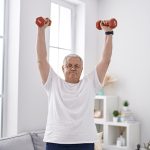-
Sound Advice
How can I prevent panic attacks?Several strategies can help address underlying fears and intense anxiety.
-
Understanding Side Effects and the Patient Experience
Researchers focus on assessing quality of life and toxicity risks in people with breast cancer.
by Thomas Celona
-
Exercise Benefits in Metastatic Breast Cancer
Study finds supervised physical activity can help improve quality of life and reduce fatigue among people with metastatic breast cancer.
by Thomas Celona
-
Seasonal Shot Strategies
Researchers find that patients with cancer who are severely immunocompromised may benefit from a more frequent seasonal vaccine schedule.
by Sandra Gordon
-
Planning for the Return Home After Surgery
Experts suggest patients prepare for home recovery before surgery to help maintain some control.
by Coeli Carr
-
Advanced Care Planning Leads to More Comfort-based Care
Preparing for future health decisions helps ensure care is suited to your priorities.
by Karon Warren
-
Your Cancer Guide
The Art of DeflectionCasual conversations can take unwelcome turns after you’ve been diagnosed with cancer. Here’s how to respond when people say the wrong things.
by Hester Hill Schnipper
-
Caregiving With Confidence
Addressing AngerCaregivers can take steps to encourage patients to have more healthy dialogue about strong emotions.
by K.J. Bannan
-
Healthy Habits
Break a SweatResearch shows physical activity during chemotherapy treatment can help patients with recovery.
by Erin O’Donnell
-
Healthy Habits
Make Time for TeaA daily tea habit is associated with improved survival for those with colorectal cancer.
by Anne Danahy
Cancer Talk
Treatment Combination Improves Survival in EGFR-positive Lung Cancer
Adding chemotherapy to targeted therapy improves outcomes for people with advanced EGFR-positive non-small cell lung cancer.
by Sandra Gordon
Lessons From 20 Years Living With CancerMultiple myeloma survivor Jonathan Gluck reflects on uncertainty, and the scientific progress that has kept him living with cancer for more than two decades.
by Eric Fitzsimmons
The Enduring Importance of Cancer Disparities ResearchOpening session from AACR conference highlights how perseverance and adversity have informed cancer disparities research over the years.
by Eric Fitzsimmons
Most Cancer Survivors Don’t Meet Healthy Diet GoalsDespite research linking fruits and vegetables to cancer survival, many people do not change their eating habits after diagnosis.
by Darlene Dobkowski















